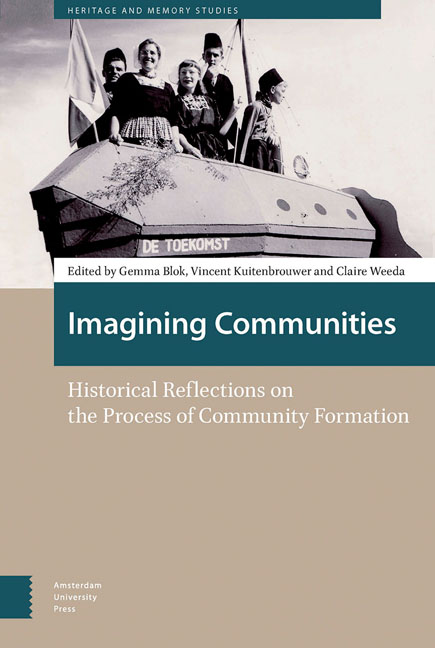Book contents
- Frontmatter
- Contents
- List of Figures
- Introduction
- 1 Meanwhile in Messianic Time: Imagining the Medieval Nation in Time and Space and English Drinking Rituals
- 2 Diverse Origins and Shared Circumstances: European Settler Identity Formation in the Seventeenth-Century Plantation Colony of Suriname
- 3 Imagining Europe: The Peace of Ryswick (1697) and the Rise of European Consciousness
- 4 Gypsy Music and the Fashioning of the National Community
- 5 ‘Tired, Worried and Overworked’: An International Imagined Community of Nervous Sufferers in Medical Advertisements, 1900-1920
- 6 ‘From Heart to Heart’: Colonial Radio and the Dutch Imagined Community in the 1920s
- 7 Indonesian Nationalism in the Netherlands, 1920s-1930s: Long-Distance Internationalism of Elite Pilgrims in Homogeneous, Empty Time
- 8 Time, Rhythm and Ritual: Imagined Communities in L’espoir (1937) and Les sept couleurs (1939)
- 9 Stamverwantschap and the Imagination of a White, Transnational Community: The 1952 Celebrations of the Jan van Riebeeck Tercentenary in the Netherlands and South Africa
- 10 ‘L’Oranie Cycliste, une grande famille’: Recycling Identities and the Pieds-Noirs Communitas, 1976-2016
- 11 Remembering and Imagining the National Past: Public Service Television Drama and the Construction of a Flemish Nation, 1953-1989
- Index
1 - Meanwhile in Messianic Time: Imagining the Medieval Nation in Time and Space and English Drinking Rituals
Published online by Cambridge University Press: 11 December 2020
- Frontmatter
- Contents
- List of Figures
- Introduction
- 1 Meanwhile in Messianic Time: Imagining the Medieval Nation in Time and Space and English Drinking Rituals
- 2 Diverse Origins and Shared Circumstances: European Settler Identity Formation in the Seventeenth-Century Plantation Colony of Suriname
- 3 Imagining Europe: The Peace of Ryswick (1697) and the Rise of European Consciousness
- 4 Gypsy Music and the Fashioning of the National Community
- 5 ‘Tired, Worried and Overworked’: An International Imagined Community of Nervous Sufferers in Medical Advertisements, 1900-1920
- 6 ‘From Heart to Heart’: Colonial Radio and the Dutch Imagined Community in the 1920s
- 7 Indonesian Nationalism in the Netherlands, 1920s-1930s: Long-Distance Internationalism of Elite Pilgrims in Homogeneous, Empty Time
- 8 Time, Rhythm and Ritual: Imagined Communities in L’espoir (1937) and Les sept couleurs (1939)
- 9 Stamverwantschap and the Imagination of a White, Transnational Community: The 1952 Celebrations of the Jan van Riebeeck Tercentenary in the Netherlands and South Africa
- 10 ‘L’Oranie Cycliste, une grande famille’: Recycling Identities and the Pieds-Noirs Communitas, 1976-2016
- 11 Remembering and Imagining the National Past: Public Service Television Drama and the Construction of a Flemish Nation, 1953-1989
- Index
Summary
Abstract
In Imagined Communities, Benedict Anderson contended that a pivotal factor in national community formation was the new experience, in modern times, of sharing daily routines with one's anonymous co-nationals in ‘calendrical’ or ‘horizontal-simultaneous’ time. This new imagining was sparked, among other things, by the rise of print-capitalism and the invention of the clock. However, in European pre-modern societies, community members already frequently employed ethnic images that bespeak a conceptual imagining of ‘ethnotypes’. In this chapter, I therefore argue that in pre-modern times a different concept of time: so-called liturgical or messianic time, specifically contributed to the cogency of ethnotypes from the tenth century onwards, in which thinking about ethnic groups’ acts in the past (in ‘vertical time’) and the significance of perceived collective behaviour and rituals performed and driven by ethnic virtues and vices of its members in the present (‘horizontal time’) and future coalesced. Thus, lists of ethnic virtues and vices reflected a religiously informed approach to time expressing the powerful notion that a shared past served as a code for understanding the present and foretelling the future, known as liturgical or messianic time. This is exemplified by a case study in which one of these ethnic vices rooted in history – English drinking – was appropriated in a sermon to excoriate the ‘communal guilt’ of the English people and its monarchy at a crucial moment in early-thirteenth-century English history: the end of the interdict in 1213. This case study in particular elucidates the process of imagining communities in medieval times, as English drunkenness was a cornerstone in the narrative of British, Anglo-Saxon and Anglo-Norman collective memory as a ‘chosen people’, who had entered into a special covenant with God; and elaborate drinking rituals were performed both on a daily basis and at a fixed moments on the calendar, namely between Christmas and New Year.
Keywords:ethnic groups, Middle Ages, virtues and vices, eschatology, time
Is the manifestation of ‘homogenous, empty time’ a prerequisite for imagining the nation, as Benedict Anderson argued it was in Imagined Communities? Indeed, in his seminal work, Anderson contended – inspired by Walter Benjamin's essay ‘Theses on the Philosophy of History’ – that communities resembled an imagined web or network, whose members experienced a sense of connectedness with their anonymous co-nationals.
- Type
- Chapter
- Information
- Imagining CommunitiesHistorical Reflections on the Process of Community Formation, pp. 21 - 40Publisher: Amsterdam University PressPrint publication year: 2018



